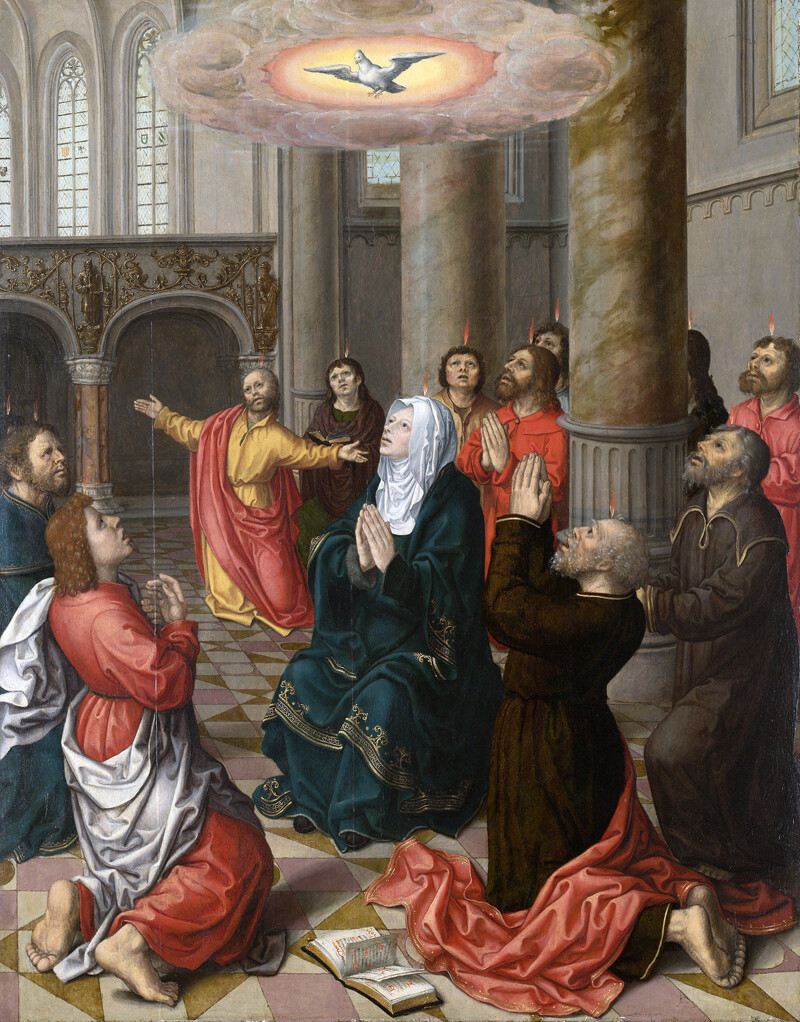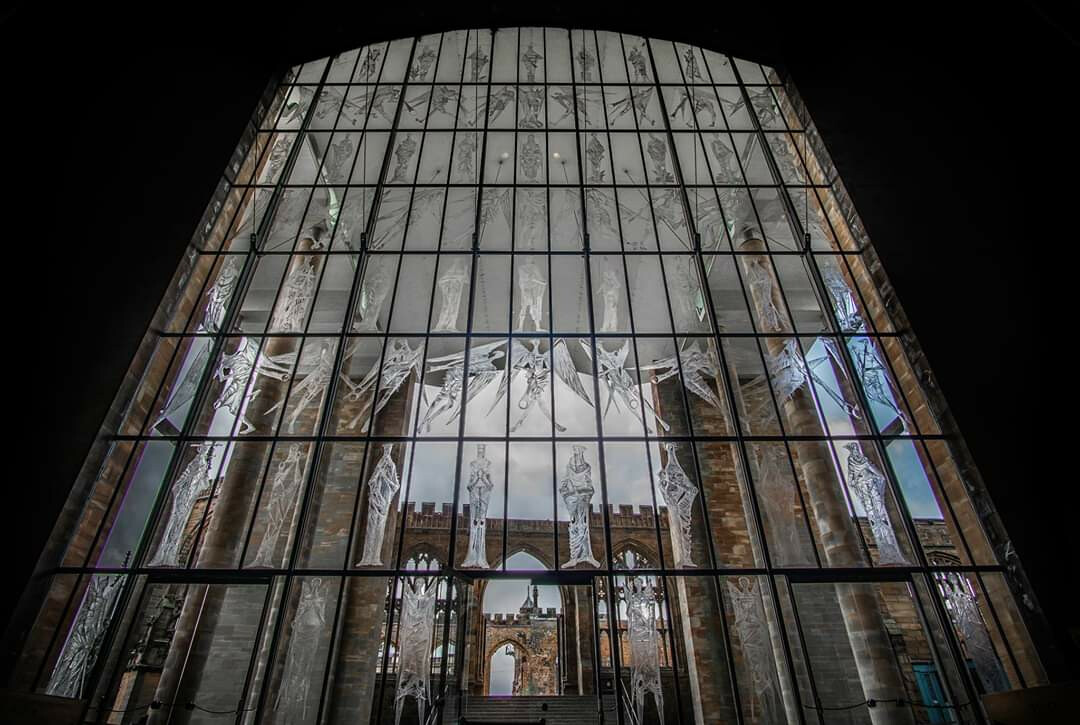Ask a Theologian: Believing in the Holy Spirit
 Pentecost from the workshop of Bernard van Orley
Pentecost from the workshop of Bernard van Orley
Dear Theologian,
Every Sunday, when we recite the Creed, I find myself saying, “We believe in the Holy Spirit...” What does it mean to believe in the Holy Spirit? Does it make any difference in the way I am to understand and live my Christian life?
Uninformed
Dear Uninformed,
In asking about the Holy Spirit, you are asking about God, and so any attempt to answer your question will involve the use of religious symbolism. This kind of symbolism, derived from Sacred Scripture, permeates our shared life of faith. When we appreciate its significance, it can draw us deeply into the Mystery that is too great for our conceptual and rational language. This is especially true when we try to think about the Holy Spirit.
In Scripture, fire is often associated with the awesome power and holiness of God. For example, Moses hides his face in reverence before the burning bush (Ex 3:1-6). Later, when he has brought the people of Israel to the sacred mountain in the desert, God’s glory appears as a raging fire upon the mountain top (Ex 24:16-17).
The story of Pentecost in the New Testament takes the image of “the fire of God” to a different level of encounter and intimacy. There, the blazing energy of God is imagined as settling upon, filling and empowering each disciple in a way that is unique and personal. “Divided tongues, as of fire, appeared among them, and a tongue rested on each of them. All of them were filled with the Holy Spirit …” (Acts 2:3-4)
Fire is not the only symbol of the Spirit in Scripture. Equally prominent and suggestive are the symbols wind and breath. In fact, there is a single Hebrew word, ruach, that can be translated as either “spirit” or “wind” or “breath,” depending on the context.
In the account of creation, in the very first book of the Bible, God’s ruach is said to move or hover over the dark and formless waters of chaos. (Gen 1:2) This can be translated variously: “The Spirit of God moved upon the face of the waters” (KJV), “… a wind from God swept over the face of the waters.” (NRSV).
The image of breath is found already in the second chapter of Genesis: “…the Lord God formed man from the dust of the ground, and breathed into his nostrils the breath of life; and the man became a living being.” (Gen 2:7)
Both wind and breath occur again in the magnificent vision of the valley of dry bones in Ezekiel 37. The mighty wind/breath/spirit of God brings the dead to life, signifying God’s intention to resurrect his people Israel from the grave and restore them in their own land.
The most vivid and moving use of the breath image occurs in the New Testament, when the risen Christ comes to his disciples, bringing them peace and imparting to them the Holy Spirit. Just as the first human being was created when God breathed his own Spirit into the “earth creature” (Gen 2:7), so now the disciples are created anew when Christ breathes his Spirit into them.
“Jesus said to them, ‘Peace be with you. As the Father has sent me, so I send you.’ When he had said this, he breathed on them and said to them, ‘Receive the Holy Spirit.’” (Jn 20:21-22)
Image and narrative draw us into the great Mystery and invite us to believe in it. In order, however, to unfold the implications of such belief, we also need at times the more prosaic and rational language of theologians. So let me quote now from the Catechism of the Book of Common Prayer.
“The Holy Spirit is the Third Person of the Trinity, God at work in the world and in the Church even now.” [1] This very succinct formulation of the Church’s teaching about the Holy Spirit needs to be developed and unfolded in order to appreciate its profound meaning.
When we say “We believe in the Holy Spirit,” we are first and foremost making an act of faith in God. But “believing in” the Holy Spirit is not merely a matter of acknowledging the “reality” of God (believing “that God is”). It is a matter of entrusting oneself to God in an attitude of surrender, obedience, and utter openness.
Furthermore, God the Holy Spirit, to whom we entrust ourselves, must be understood as being “at work in the world and in the Church even now.” The Spirit is active, dynamic, creative—bringing into being what did not exist and raising the dead to life. (Rom 4:17)
Truly believing in the Holy Spirit, with heart and mind, makes all the difference in how you understand and live your life of Christian commitment.
First of all, it means that you see your very life of faith in Christ as made possible only by the presence and power of God the Holy Spirit within you. It is sheer gift, not your own achievement.
Believing in the mystery of the Holy Spirit involves the attitude of utter and unqualified dependence upon God in all your efforts and labors. This involves a profound humility and detachment with regard to the good works that you carry out. This runs counter to the tendency to glory in one’s own achievements (what St. Paul calls “boasting”). In reality, all is gift.
When we are submissive to the Spirit, we put ego aside and let God act through us. Instead of asking God to help us do something that we intend, we simply ask God to take us, fill us, and use us for God’s purposes. Being yielded to the Spirit also involves being taught, strengthened, encouraged, and filled at times to overflowing with the joy of God.
The action of the Spirit is, of course, by no means limited to the individual. To believe in God the Holy Spirit is to believe that God is creating and continually renewing a community in history which lives with the life of the risen Jesus, a community that transcends all boundaries of time, place, race, and culture, a community in which sinful people are forgiven, healed, and transformed.
In this Spirit-created communion, there are many different gifts and functions, but one shared life “in Christ.” “…we, who are many, are one body in Christ, and individually we are members one of another. We have gifts that differ according to the grace given to us…” (Rom 12:5-6)
Believing in the Holy Spirit allows us to live with hope in the midst of troubles, confusion, and uncertainty. This is true not only for each individual person, but also for the social reality that is the Church. If we believe that God the Holy Spirit is actively present, “at work,” both in our personal journeys and in the long pilgrimage of the Church through history, we have a reason for hope, even though the present situation may look very dark. It is God the Holy Spirit who creates, guides, re-creates and renews the Church in every generation.
Believing in the Holy Spirit also gives us hope for the larger world beyond the Church—because the Holy Spirit is God “at work” in the entire world, in every individual human person and in every community of persons. Wherever we recognize healing and reconciliation, we can rejoice in the presence of the Holy Spirit.
Believing in the Holy Spirit enables us to live with a confident, positive attitude. We need not be afraid of the future, for it is God’s future. We need not cling to past customs and thought patterns, but can be open to the new. For it is characteristic of God the Creator Spirit to be always doing something new. “Do not remember the former things, or consider the things of old. I am about to do a new thing; now it springs forth, do you not perceive it?” (Isa 43:18-19)
It is a momentous confession of faith when we say, in the Creed, “We believe in the Holy Spirit.” But it is perhaps only in personal prayer that each of us reaches the deepest realization of what this means.
In Christ,
The Theologian
[1]BCP, p. 852.
The Rev. Wayne L. Fehr wrote a column for a previous version of the diocesan newsletter called "Ask a Theologian." He answered questions from ordinary Christians trying to make sense of their faith. Now he's back with a monthly column once again. You can find and purchase his book "Tracing the Contours of Faith: Christian Theology for Questioners" here.

 'Screen of Saints and Angels' at Coventry Cathedral, by John Hutton (1906 - 1978). Photo by Tara Rutledge - Own work, CC BY-SA 4.0,
'Screen of Saints and Angels' at Coventry Cathedral, by John Hutton (1906 - 1978). Photo by Tara Rutledge - Own work, CC BY-SA 4.0, 